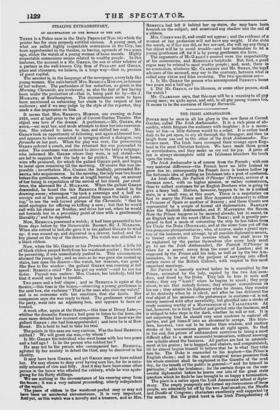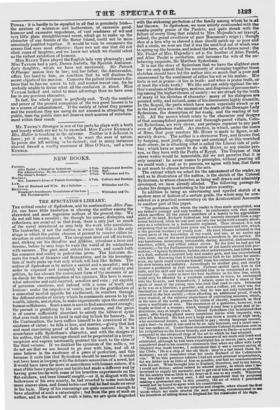Garden, called The Irish Ambassador. It is a rich piece
of ab• avers,—sat next her, and made attempts to draw her into conversa- surdity, which fatigues the audience with laughter : it is a mono- tion. She refused tc listen to him, and shifted her seat. Mr. tong of fun—a little dulness would be a relief. It is rather hard GREEN took an opportunity of following, and again addressed her; duty to be put upon, to cry all through the Stranger, and then to and appears to have succeeded in bringing about a dialogue, very laugh from one end to the other of the Irish Ambassador. Ex- farouche on her part. When the play was over, the persevering tremes meet. The Irish have revenged their wrongs upon Eng- GREEN ordered a coach, and the reluctant fair was persuaded to in wretchedness, and they make us cry out for joy. A piece of who informed Mr. GREEN where they were, is not stated—we fun is always incomplete until an Irishman blunders his torch are led to suppose that the lady so far yielded. When at home, upon the train.
The Irish Ambassador is of course from the French ; with one to insist upon remaining till the morning. Of course this was im- very material difference—the French have no little Ireland to ' possible - nevertheless '.Mrs. COHEN, the landlady, persuaded RE grow fun in; consequently the French farce is beaten hollow by BECCA into acquiescence. In the morning, the lady rose two hours the fortunate idea of putting an Irishman into a post of confusion. beforethe gentleman, whom she at length hurried up, on account of her being in expectation of the arrival of her friend par excel- An Irish officer, Sir Patrick O'Plenipo' (POWER), arrives at a lence, the aforesaid Sir J. MILBANK. When the gallant GREEN German court, with no higher mission, or rather commission, descended, he found the fair REBECCA HOBSON seated in the than to collect costumes for an English Duchess who is going to drawing-room ; whereupon "he took a sovereign and a half so- give a fancy ball. Matters, however, happen to be in a critical vereign out of his pocket, and placed them upon the table ; stat- state, in a small way, at this court. There is a negotiation on ing," to use the well-turned phrase of the Chronicle, " that he foot .to marry the Prince and Heir Apparent (ABBoTT) to either must apologize for offering so trifling a sum ; but that he would a Princess of Spain or another of Saxony ; and these Courts are all with his chaise on Sunday, and drive her out, when he would represented by a couple of formal old diplomatists. BARTLEY act towards her in a pecuniary point of view with a gentlemanly does the Spanish Ambassador, and F. MATTHEWS the Saxon. POWER : it is hardly to be equalled in all that is genuinely Irish— the mixture of acuteness and botheration, of excessive good- humour and excessive impudence, of -vast readiness of wit and very little plain straightforward sense, which go to make up the --character of our friends of the Sister island, could not be more amusingly jumbled together. It would be vain to enumerate the scenes that were most effective : there was not one that did not elicit roars of laughter, and we know not which we should select as the richest exhibition of humour.
Miss ELLEN TREE played the English lady very pleasingly; and Miss TAYLOR had a part, Donna Isabella, the Spanish Ambassa- dor's daughter, which we have not 'mentioned. Sir Patrick O'Plenipo' makes love :to her; and her father, the Ambassador, offers her hand to him, on condition that he will disclose the secret objects of his mission. Conceive the gallant Irishman's dis- tress that he has no secret to tell, and cannot invent one, for he iswholly unable to divine what all-the confusion is about. Miss TAYLOR looked and acted to more advantage than we have seen her in any previous character. In fact, the whole piece is perfectly cast. Truly the number and power of the present companies of the two great houses is to us a source of astonishment. If the variety of talent they possess and the exertions they are using do not succeed in attracting the public, then the public does not deserve such sources of entertain- ment within their reach.



























 Previous page
Previous page